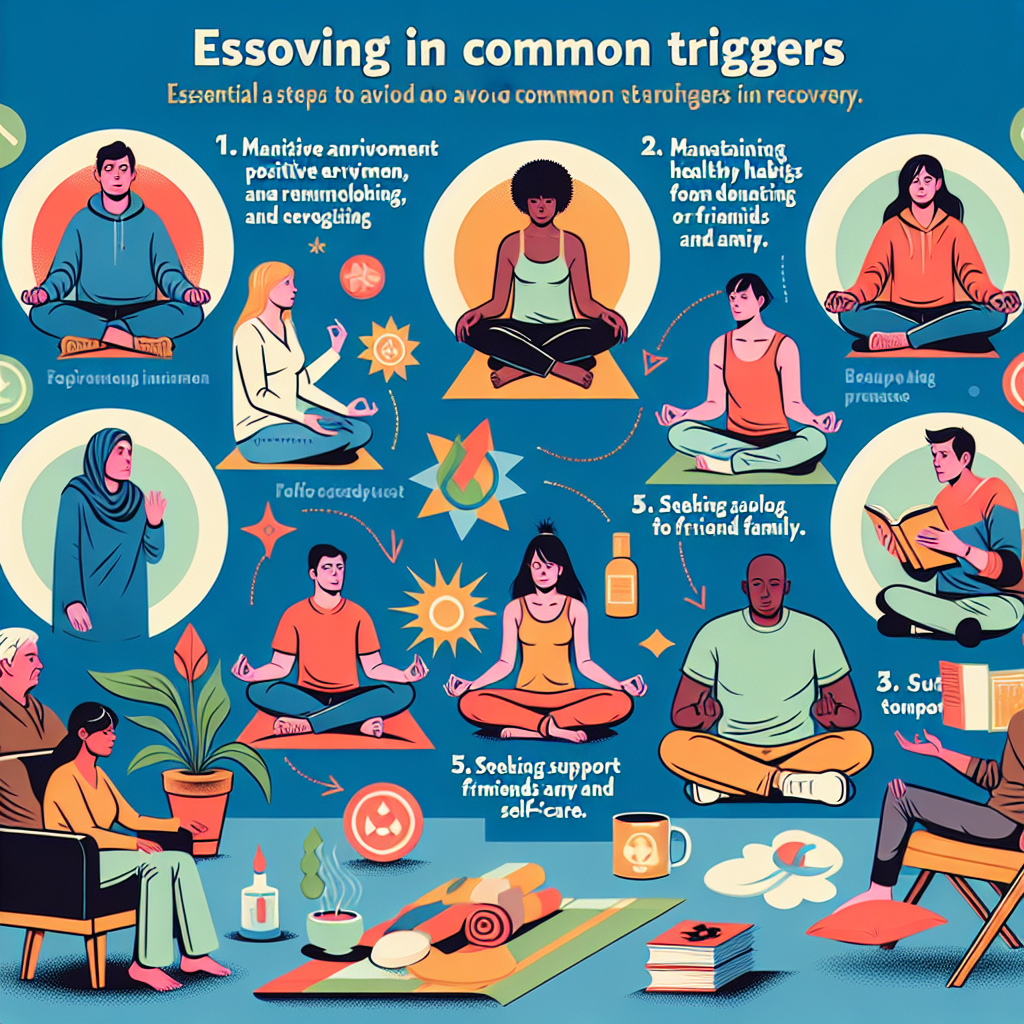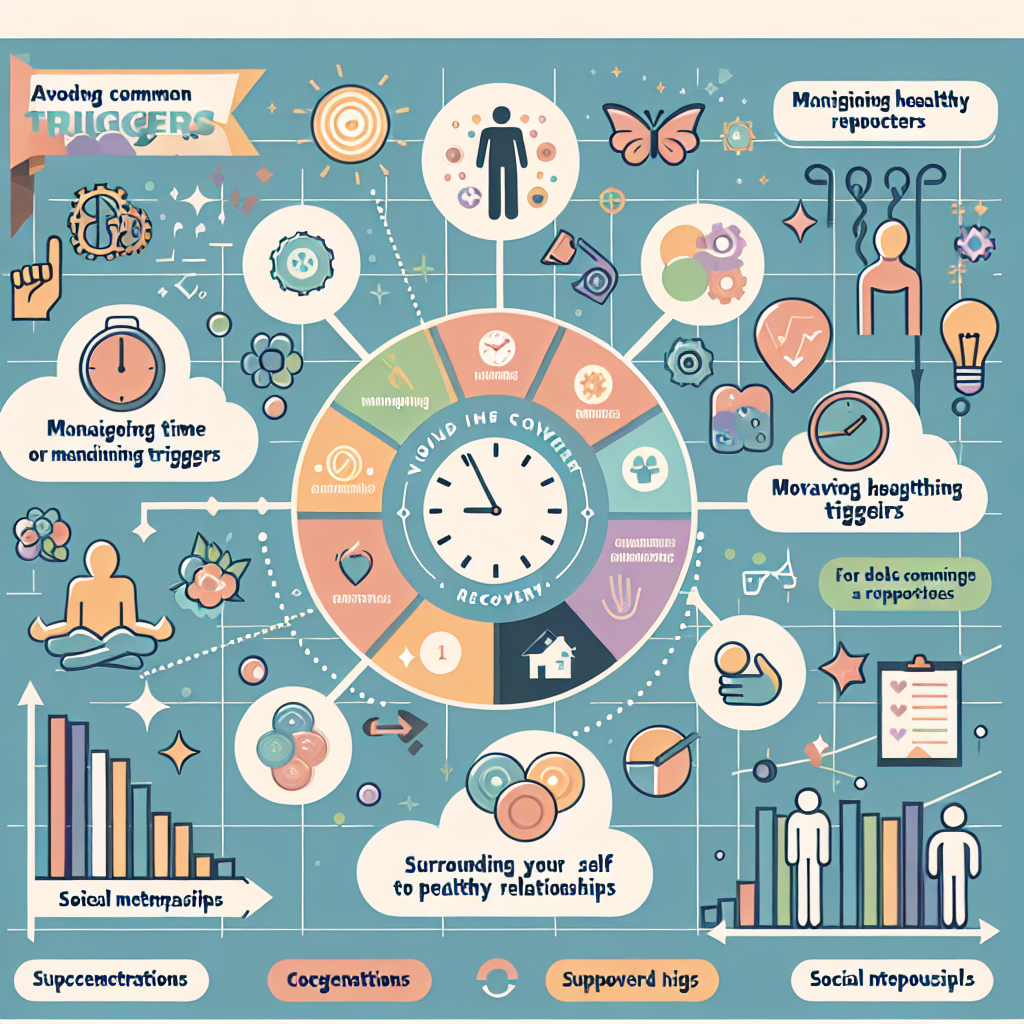-
Table of Contents

“Navigate Your Path: Mastering the Art of Avoiding Triggers in Recovery”
Introduction
Recovery from addiction is a challenging journey that requires vigilance, commitment, and strategic planning. One of the most critical aspects of maintaining sobriety is learning how to avoid common triggers that can lead to relapse. Triggers are stimuli—such as people, places, emotions, or situations—that can provoke cravings and temptations to return to substance use. Understanding and identifying these triggers is the first step in developing effective coping mechanisms. This guide will explore practical strategies to recognize and avoid common triggers, offering tools and techniques to help individuals in recovery stay on the path to long-term sobriety. By implementing these strategies, those in recovery can build resilience, enhance their self-awareness, and create a supportive environment conducive to their ongoing healing and personal growth.
Identifying and Managing Environmental Triggers in Recovery
Recovery from addiction is a journey that requires not only personal commitment but also a keen awareness of the environment that surrounds you. Identifying and managing environmental triggers is a crucial aspect of maintaining sobriety and ensuring long-term success. These triggers can be subtle or overt, but recognizing them and developing strategies to cope can make all the difference in your recovery process.
One of the first steps in managing environmental triggers is to identify them. Triggers can be anything in your surroundings that elicit a strong urge to use substances. These can range from specific places, people, or even certain times of the day. For instance, walking past a bar where you used to drink or encountering friends who still use substances can be powerful triggers. By being mindful of these potential pitfalls, you can begin to develop a plan to avoid or cope with them.
Once you have identified your triggers, the next step is to create a supportive environment that minimizes exposure to these risks. This might involve making some difficult but necessary changes, such as avoiding certain social circles or finding new routes to work that don’t pass by tempting locations. Surrounding yourself with positive influences, such as supportive friends and family members, can also help reinforce your commitment to sobriety. Additionally, engaging in new, healthy activities can provide a constructive outlet for your energy and emotions, reducing the likelihood of encountering triggers.
However, it is not always possible to avoid all triggers, and this is where developing coping strategies becomes essential. One effective approach is to practice mindfulness and stress-reduction techniques. Mindfulness can help you stay present and aware of your thoughts and feelings, allowing you to recognize when a trigger is affecting you and take steps to manage it. Techniques such as deep breathing, meditation, and yoga can help reduce stress and increase your resilience to triggers.
Another important strategy is to have a plan in place for when you do encounter a trigger. This might involve having a list of supportive contacts you can call, engaging in a distracting activity, or using positive affirmations to remind yourself of your commitment to recovery. By having a plan, you can feel more confident and prepared to handle challenging situations.
In addition to these personal strategies, seeking professional support can be incredibly beneficial. Therapists and counselors who specialize in addiction recovery can provide valuable guidance and tools for managing triggers. Support groups, such as Alcoholics Anonymous or Narcotics Anonymous, offer a sense of community and shared experience that can be incredibly empowering. These resources can provide both practical advice and emotional support, helping you stay on track in your recovery journey.
Ultimately, managing environmental triggers in recovery is about creating a balanced and supportive lifestyle that prioritizes your well-being. It requires a combination of self-awareness, proactive planning, and the willingness to seek help when needed. By taking these steps, you can build a strong foundation for lasting sobriety and a healthier, more fulfilling life. Remember, recovery is a journey, and every step you take towards managing your triggers is a step towards a brighter future. Stay committed, stay mindful, and know that you have the strength to overcome any challenge that comes your way.
Developing Healthy Coping Mechanisms to Combat Emotional Triggers
Developing healthy coping mechanisms to combat emotional triggers is a crucial aspect of recovery. Emotional triggers can be powerful and often unexpected, leading to feelings of vulnerability and the potential for relapse. However, by understanding these triggers and implementing effective strategies, individuals can navigate their recovery journey with greater resilience and confidence.
One of the first steps in developing healthy coping mechanisms is to identify the specific emotional triggers that pose a risk. These triggers can vary widely from person to person and may include stress, anxiety, loneliness, or even certain social situations. By keeping a journal or engaging in regular self-reflection, individuals can gain insight into the emotions and circumstances that tend to lead to negative behaviors. This awareness is the foundation upon which healthier coping strategies can be built.
Once emotional triggers are identified, it is essential to develop a toolkit of coping mechanisms that can be employed when these triggers arise. One effective strategy is mindfulness meditation, which encourages individuals to stay present and observe their thoughts and feelings without judgment. This practice can help reduce the intensity of emotional reactions and provide a sense of calm and clarity. Additionally, deep breathing exercises can be a quick and accessible way to manage stress and anxiety in the moment.
Another valuable coping mechanism is physical activity. Exercise has been shown to release endorphins, which are natural mood lifters. Whether it’s a brisk walk, a yoga session, or a more intense workout, physical activity can help shift focus away from emotional distress and promote a sense of well-being. Moreover, engaging in regular exercise can improve overall physical health, which in turn supports mental and emotional stability.
Social support is also a critical component of developing healthy coping mechanisms. Building a network of supportive friends, family members, or recovery groups can provide a sense of connection and understanding. These relationships offer a safe space to share experiences, seek advice, and receive encouragement. Additionally, professional support from therapists or counselors can provide tailored strategies and insights to help manage emotional triggers effectively.
Creative outlets can also serve as powerful coping mechanisms. Engaging in activities such as painting, writing, or playing music allows individuals to express their emotions in a constructive and therapeutic manner. These creative pursuits can provide a sense of accomplishment and purpose, helping to counteract negative emotions and reduce the risk of relapse.
Furthermore, establishing a routine can provide structure and stability, which are essential for managing emotional triggers. A consistent daily schedule that includes time for self-care, work, social activities, and relaxation can help individuals feel more in control and less susceptible to emotional upheaval. This routine should also incorporate healthy habits such as balanced nutrition, adequate sleep, and hydration, all of which contribute to overall well-being.
In addition to these strategies, it is important to practice self-compassion. Recovery is a journey, and setbacks are a natural part of the process. By treating oneself with kindness and understanding, individuals can maintain a positive outlook and continue to move forward, even in the face of challenges.
In conclusion, developing healthy coping mechanisms to combat emotional triggers is an essential part of recovery. By identifying triggers, employing mindfulness and physical activity, seeking social and professional support, engaging in creative outlets, establishing a routine, and practicing self-compassion, individuals can build resilience and navigate their recovery journey with greater confidence and success.
Q&A
1. **Question:** What are some strategies to avoid social triggers in recovery?
**Answer:** To avoid social triggers, one can limit contact with people who use substances, attend support group meetings, and build a network of sober friends.
2. **Question:** How can one manage emotional triggers during recovery?
**Answer:** Managing emotional triggers can involve practicing mindfulness, engaging in regular physical exercise, seeking therapy or counseling, and developing healthy coping mechanisms like journaling or meditation.
Conclusion
To avoid common triggers in recovery, it is essential to identify and understand personal triggers, develop a strong support network, and create a structured routine. Engaging in healthy activities, practicing mindfulness, and seeking professional help when needed can also be beneficial. Avoiding high-risk situations, setting clear boundaries, and continuously working on coping strategies are crucial steps in maintaining long-term recovery.



